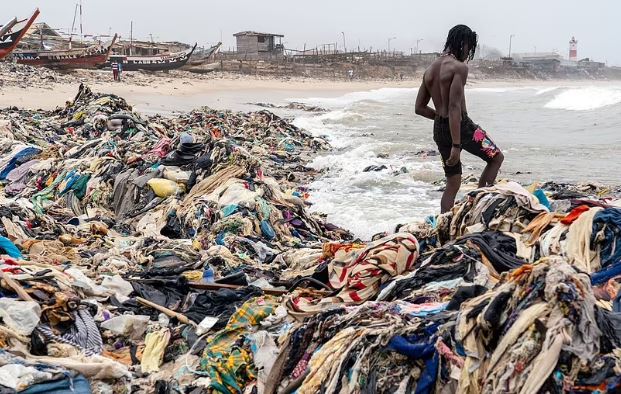Despite the promise of large businesses like “H&M” and “Zara,” to recycle her worn garments, the British daily “Daily Mail” revealed images of millions of clothes used for global brands on the beach of the Ghanaian capital, Akra.
Only 10% of the three billion garments produced annually by the H&M brand are recycled; the remainder is delivered to cities like Ghana’s capital of Accra, where there are mountains of worn clothing that clog some water sources.
Over 15 million worn clothing from the United Kingdom, Europe, North America, and Australia are sent to Accra, according to the American “ABC” network.
At least 40% of these garments are of subpar quality, making them valuable and being dumped in populated areas’ rubbish dumps.
More than 100 billion clothing is produced all over the world every year, and 85% of them are thrown into the landfill or burned, as it is believed that the average American citizen throws 70 lbs of other clothes and textiles every year.
In 2013, the H&M brand became the first international fashion retail chain to introduce a clothes collection programme across all of its locations.
This is accomplished by getting the business ready to supply recycling boxes to consumers for their clothing deliveries, regardless of the brand.
A retail seller of used clothing in Uganda told Bright magazine: “We are used to making clothes, but there is this new form of colonialism who want to bring their products in this way so they cannot allow us to make our products. Since the start of the programme, the brand has collected more than 141 thousand tonnes, or more than three million pounds, of textiles from the countries of the world.
“Many members of the East Africa Group signed a petition in 2015 calling for a ban on the import of clothing, and the group hoped to end that ban by 2019. However, according to the newspaper, the group was pressured to end its contact by the United States, which is rumoured to be resuming initiatives in the growth and opportunities law in Africa.
This is considered a commercial program that gives countries in Africa a preferential access to the American markets, allowing them to export products without customs duties.
At least 40,000 jobs in America will be lost if the United States is unable to sell clothing to Africa, and 150,000 employment will be badly impacted.
However, the United States is probably more worried that international fashion companies would quit the country as a result of their inability to ship to poor nations.
African nations are subjected to boredom in return for 150,000 Americans continuing to work.

